21 October 2017
Proving there is no God and the Stormont deal that wasn’t
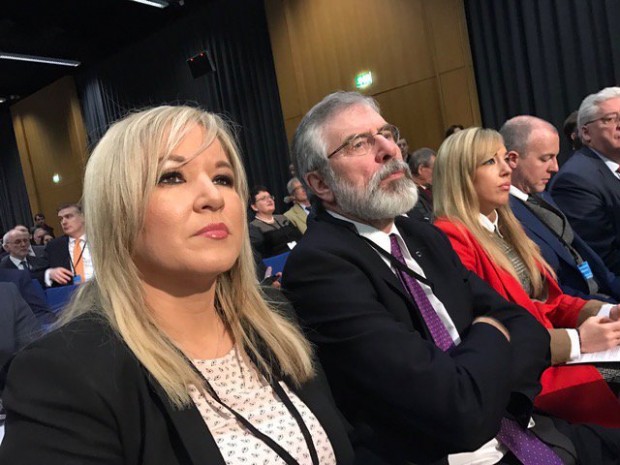
This process is slow – but it must be got right
Ciarán Quinn is
Sinn Féin Director of Communications
OVER the past fortnight, the talks to re-establish the Executive in the North have been blown off course by the constant media spin by the two governments.
There are still real issues to be resolved.
Issues of marriage equality, language rights and access to inquest are central to the negotiations.
At the core is of the crisis is the fact that the political process has been undermined by the refusal to honour previous agreements and the refusal of rights that are enjoyed by citizens in the rest of Ireland and Britain.
In our everyday life, if we entered an agreement we would rightly expect it to be honoured or else we would never deal with the same people again. That is what is at issue in the North.
The objective of the talks between the Democratic Unionist Party and Sinn Féin is to reach an agreement to re-establish a sustainable Executive that works for all with integrity and respects the rights of all citizens.
This process is slow – but it must be got right.
Throughout the process, Sinn Féin has been consistent with our assessment of the discussions. Talks were continuing and serious issues remained outstanding.
This has not been the approach of either the British Government or the Irish Government.
Instead of standing up for the process and making it clear that an agreement made must be an agreement implemented, they have walked away from their role as joint guarantors of the agreements from the Good Friday Agreement on.
The Tories in London (a bit more subtly than the Spanish Government dictating from Madrid) have sought to strongarm the process with threats of direct rule despite this being contrary to the agreements.
Last week they decided to talk up the chance of agreement. This appears to have been a misguided attempt to raise public expectations of an agreement and try and bounce Sinn Féin into going back to the status quo that forced the late Martin McGuinness’s resignation in January.
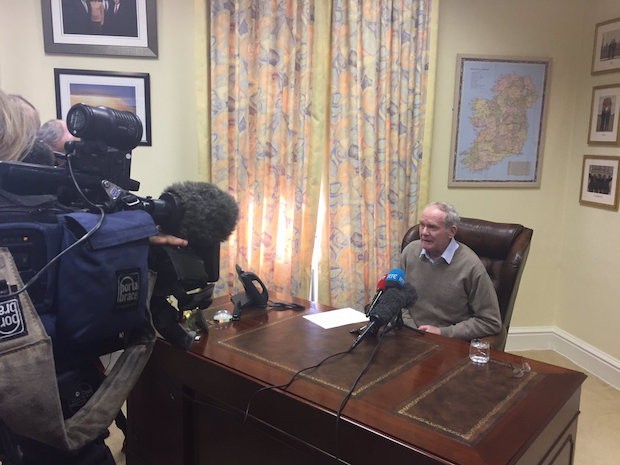
● Martin McGuinness resigns
Last Wednesday week (11 October), Irish Foreign Affairs Minister Simon Coveney suggested a possible agreement by the end of the week. He also said that both Sinn Féin and the DUP “want the process to work”
On Thursday (12 October), high-profile Tory MP Andrea Leadsom said in Westminster with regard to a legislative timetable that she was “hopeful of good news” from the North.
At the same time, both governments were briefing journalists that an agreement was imminent and most of the issues had been resolved.
In order to inject some realism into the situation, Michelle O’Neill on Thursday issued a statement as Sinn Féin leader in the North that made clear that very real challenges remained.
This was a realistic assessment of the talks.
There was no deal on the table.
Later that day, the DUP issued a similar assessment.
Despite this, the briefings and speculation fuelled by the two governments continued. It was a deliberate attempt to bounce the negotiations.
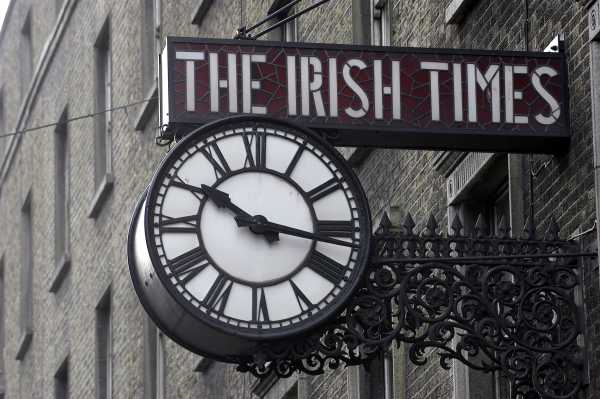
On the Saturday morning (14 October), based on briefings, the Irish Times ran the line:
“It may take a few more days, and maybe into next week and perhaps a little beyond, before we know for sure if Stormont will be reinstated.”
The direction of travel was clear: the odds were on a deal.
On the same day, the DUP released a statement that the speculation of an imminent breakthrough had “no basis in fact”.
When Gerry Adams was asked about this statement before going into the Sinn Féin Ard Chomharle’s monthly meeting in Dublin that Saturday morning (14 October), he said that he agreed with the assessment. This was widely reported by RTÉ.
So, despite the efforts of the governments, it was clear that Sinn Féin and the DUP continued to talk but both agreed that no agreement was imminent. This directly contradicted the briefings of the governments.
When asked to explain this contradiction on Tuesday of this week (17 October), Taoiseach Leo Varadkar said:
“I will let the different parties account for themselves as to what went wrong.”
For Leo, it was now the fault of the parties to explain the deal that never was!
The Fine Gael leader then launched an attack on why there was a demand for an Irish Language Act – despite this being a central part of the St Andrew’s Agreement and key to the issue of rights and equality.
In his outburst, the new Taoiseach displayed a complete lack of understanding of the agreements and issues in the North. This is a recurring feature of Leo Varadkar’s approach to the North.
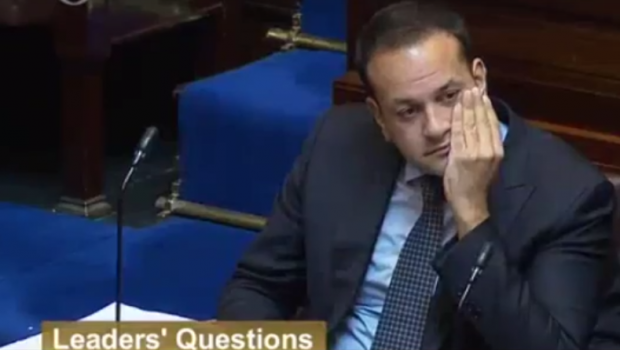
● The new Taoiseach displays a complete lack of understanding of the agreements and issues in the North
A briefing from a senior Irish Government source on Tuesday tried to explain away how his government had called it so wrong by inventing a story that Michelle O’Neill had the basis for a deal but it had been rejected. Depending on what paper you read, it was rejected by a combination of Gerry Adams, the Sinn Féin Ard Chomhairle and ‘the hard men of Sinn Féin’ (always hard men, never hard women).
None of this was true.
They was no deal to discuss or reject.
What is clear is that on being caught out lying on the briefing of an imminent breakthrough, Fine Gael’s already-infamous spin machine resorted to type – blame Sinn Féin and Gerry Adams for an Establishment mistake.
Sinn Féin was being asked to prove that something that didn’t happen really didn’t happen.
Just because it makes the news doesn’t make it true. ‘We have been told this, we believe this,’ the media line goes, ‘so it must be true.’
In truly Kafkaesque fashion, Sinn Féin was being asked to prove that God doesn’t exist – an impossible task.
It seems to have reached the peak of nonsense when one journalist noted that only Sinn Féin had rubbished the idea that Sinn Féin had rejected a deal that didn’t exist.
What we do have are the public comments from the parties involved that are consistent – and we have the positions of the governments that are completely inconsistent.
All of this is not without a cost.
Days of talks have been lost in dealing with these briefings. Confidence in the Taoiseach and the Irish Government has been diminished and the faith in the political process further eroded. And all of this is due to media spin by government politicians and their handlers.
Gerry Adams has made clear that Sinn Féin is committed to re-establishing the institutions in the North, to implementing the agreements, to rebuilding trust in the political process, and delivering rights and respect for all. He is, after all, one of the negotiators, architects and constant promoters of the agreements.
There is no indication that the DUP are prepared to address these issues in a comprehensive way and talks continue. Rather than face down the denial of rights which are available in every other part of these islands, the two governments are now attempting to shoe-horn Sinn Féin into a suboptimal deal.
That is not going to happen.
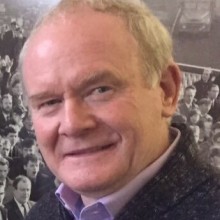 Sinn Féin will
not be bounced into a deal which fails to address the issues set out by Martin
McGuinness when he resigned as deputy First Minister in January.
Sinn Féin will
not be bounced into a deal which fails to address the issues set out by Martin
McGuinness when he resigned as deputy First Minister in January.
If the Irish Government wants to play a constructive role in the process it must stand over the agreements, must stand up for rights that citizens enjoy everywhere else in these islands, and must stop playing second fiddle to the British Government.
Leo Varadkar can play party politics through his spin machine but that makes it harder for us all to reach an agreement. As Gerry Adams said, he can act as a Taoiseach or he can act as the leader of Fine Gael. While the choice is his; the consequences will be felt by us all.
Follow us on Facebook
An Phoblacht on Twitter
Uncomfortable Conversations

An initiative for dialogue
for reconciliation
— — — — — — —
Contributions from key figures in the churches, academia and wider civic society as well as senior republican figures





